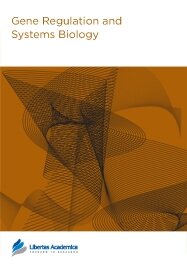

Publication Date: 12 Nov 2007
Journal: Gene Regulation and Systems Biology

1Department of Clinical Molecular Genetics, School of Pharmacy, Tokyo University of Pharmacy and Life Sciences, 1432-1 Horinouchi, Hachioji, Tokyo 192-0392, Japan. 2Department of Medicine, Division of Infectious Disease, University of California, San Francisco, 513 Parnassus Avenue, San Francisco, CA 94143, U.S.A.
Abstract: Influenza virus infection induces apoptosis and the expression of a set of pro-inflammatory cytokine genes, such as interleukin (IL)-6, tumor necrosis factor (TNF)-α, interferon (IFN)-β and IFN-γ, in cultured human fetal membrane chorion cells. Monocyte differentiation-inducing (MDI) activity in culture supernatants is simultaneously increased by the virus infection. The MDI activity is predominantly influenced by IL-6 molecule in culture supernatants, and partly by TNF-α and IFN-β, but not IFN-γ, molecules. The MDI factors are able to induce the mRNA expression of macrophage class A scavenger receptor (SR-A), which is one of adhesion and apoptotic cell-recognizing molecules, and gp91phox, which is a catalytic subunit of reduced nicotinamide adenine dinucleotide phosphate (NADPH) oxidase enzyme complex, on monocytic cells. As a result, monocytes are initiated to differentiate into well-matured macrophages capable of adhering and producing superoxide through NADPH oxidase. The matured macrophages, obtained from human monocytic leukemia THP-1 cells by the treatment with MDI factors, phagocytose apoptotic chorion cell debris resulting from the virus infection. Subsequent to phagocytosis, an abrupt increase of superoxide production by macrophages may occur. In this article, we summarize recent knowledge about the MDI factors derived from human fetal membrane chorion cells undergoing apoptosis after influenza virus infection, and discuss their possible pathological roles during pregnancy.
PDF (432.77 KB PDF FORMAT)
RIS citation (ENDNOTE, REFERENCE MANAGER, PROCITE, REFWORKS)
BibTex citation (BIBDESK, LATEX)
XML
PMC HTML
Publishing in Air, Soil and Water and Water Research was the best experience I have had so far in an academic context. The review process was fair, quick and efficient. I congratulate the team at Libertas Academica for a very well managed journal.Magnus Karlsson (IVL Swedish Environmental Research Institute, Stockholm, Sweden) What Your Colleagues Say
Copyright © 2012 Libertas Academica Ltd (except open access articles and accompanying metadata and supplementary files.)
FacebookGoogle+Twitter
PinterestTumblrYouTube